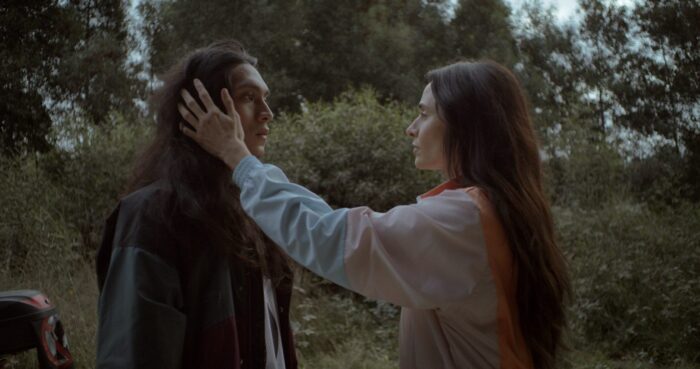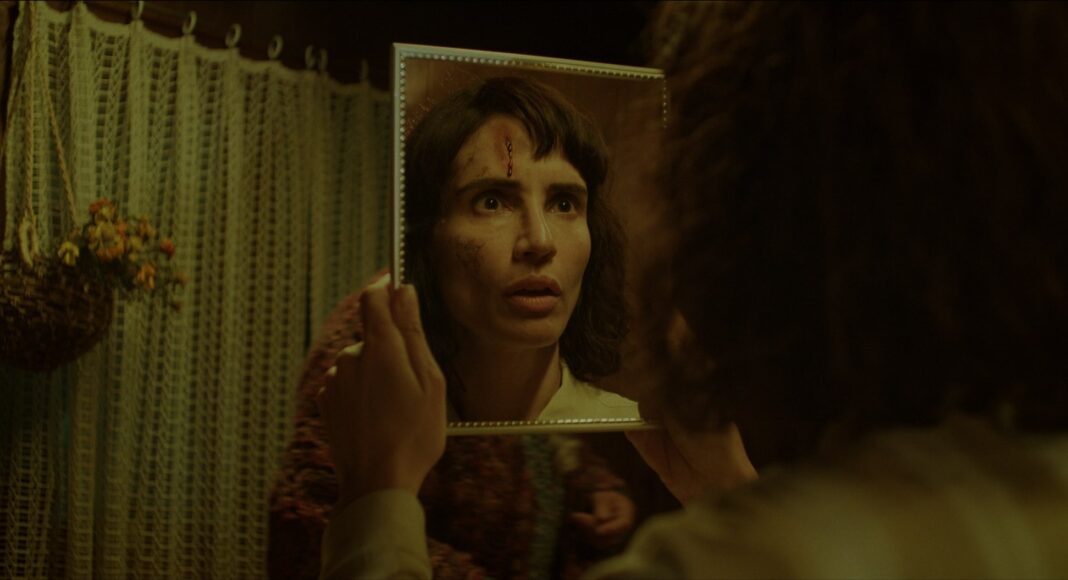Chilean director Francisca Alegría’s surreal debut film The Cow Who Sang a Song Into The Future, released 24 March in UK cinemas, is a 90-minute magical realist eco-fable that was nominated for the Grand Jury Prize at the 2022 Sundance Film Festival.
Set in the beautiful Chilean wilderness, artfully captured by Inti Briones, the film opens with a haunting soundtrack as the viewer is taken through fertile forests all the way to the shores of the River Cautín where the local fauna and flora is in notable decline. From the depths of the polluted river, a spluttering Magdalena (Argentine actress Mia Maestro) emerges, fighting for air as she lies among dead fish on the riverbank. Removing her motorcycle helmet she journeys home barefoot, silently navigating the rugged countryside. Once she steps back into her country home, she causes her elderly estranged husband Enrique (Alfredo Castro) to suffer a heart attack.
Meanwhile in the Chilean Capital, Santiago, fraught professional single mother Cecilia (Leonor Varela) buckles under the weight of keeping all plates spinning at the hospital she works as a heart surgeon and as the mother of trans son, Tomas (Enzo Ferrada), whose gender-fluid identity she struggles to accept. Upon hearing of her father’s hospitalization, the family head South, deep into the Chilean countryside and into a magical realm where family trauma becomes synchronized with the environmental carnage a wood processing plant is wreaking on the local river and its ecosystems.
At the family ranch, a dairy farm, Cecilia and her two children are met by her brother Bernardo (Marcial Tagle), whose life has taken a very different course than the glamourous city life that Cecilia has made for herself since the suicide of their mother drove her away.

Enrique is discharged from the hospital and returns to the care of his family, who are reacquainting themselves with life at the ranch. But Magdalena’s presence unsettles and confuses Cecilia as she ventures deep into the woods for answers. As the family edge closer to the source of their dysfunction and trauma, the world outside spins out of control. As the patriarch weakens and their beloved cows succumb to the toxicity of the river, the family is confronted with the ghosts of their familial tragedy and the destructive trajectory of the past catching up with the present is set in motion.
Mesmerizing imagery, shot by skilled cinematographer Inti Briones, lends the film a phantasmagorical feel not too dissimilar to the magical realism deployed by A24 productions such as The Witch, which utilizes nature as a metaphor for foretelling, accompanied by a haunting soundtrack that skilfully creates tension throughout the film.
It is telling that The Cow was shot in the Araucanía region which today lies at the centre of the so-called ‘Mapuche conflict’, where a silent war against Indigenous communities and environmentalists is being waged by armed security forces protecting the interests of forestry and salmon industries, wrecking the environment across the region. The film manages to subtly relay the real-life battle for the survival of those communities that depend on the land in affected areas, clearly denouncing the damage unleashed upon the environment by unscrupulous wood processing plants such as Forestal Arauco, named and shamed in the film. It also manages to convey how familial trauma left to fester, can destroy future generations if not confronted. As we watch the family crumble under the weight of its own history, we will for them, as we will for humanity, to open its eyes and see the signs.
See here for details of UK screenings in Bristol, Newcastle, and London’s Rich Mix – followed by a Q&A with Kate Metcalf, co-director of Women’s Environmental Network, and Sofia Serbin de Skalon, a film and culture writer specialising in Latin American cinema and founder of the Argentine Film Festival.


